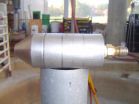(Press-News.org) Researchers from North Carolina State University have developed a sensor that allows engineers to assess the scour potential of soils at various depths and on-site for the first time – a technology that will help evaluate the safety of civil infrastructure before and after storm events. Scour, or erosion of soil around structures due to water flow, is responsible for a wide range of critical infrastructure failures – from unstable bridges to the levees that gave way in the wake of Hurricane Katrina.
"The 'in situ scour evaluation probe' (ISEP) is the first technology that allows technicians in the field to measure the scour potential of soils without the need for excavation," says Dr. Mo Gabr, a professor of civil, construction and environmental engineering at NC State and co-author of a paper describing the new device. "Previous technologies required engineers to take samples and process them in a lab."
Understanding scour potential is important because it can help authorities prepare for, or minimize the impact of, events such as the failure of the levees in the wake of Katrina. Scour has also been linked to approximately 60 percent of the bridge failures in the United States, as documented by the Federal Highway Administration.
"The ISEP's ability to measure scour potential at different depths helps us predict how the soil will behave in the future as a support media, as various layers of soil are eroded or scoured," Gabr says.
The ISEP will also allow end-users such as federal and state agencies and private consultants to perform scour assessment more frequently, since they will not have to take physical samples back to a lab for analysis. More testing data means researchers will have a larger data set to work with, which should help them to more accurately predict scouring rates and behavior.
The new probe uses a water jet to burrow a hole into the soil. Researchers can track the rate at which the water displaces the soil to determine the scour rate. Researchers can also manipulate the velocity and flow rate of the water to simulate various natural events – from normal stream flow to hurricane-induced surges.
The researchers plan to take the ISEP to North Carolina's Outer Banks later this month to help with research efforts related to dune erosion.
INFORMATION:
The paper, "In Situ measurement of the scour potential of non-cohesive sediments (ISEP)," was presented Nov. 8 at the 5th International Conference on Scour and Erosion in San Francisco, Calif. The lead author is NC State graduate student Cary Caruso. The ISEP was developed under a grant from the U.S. Department of Homeland Security (DHS), as part of the work being done by the DHS Center of Excellence on Natural Disasters, Coastal Infrastructure and Emergency Management.
New tech to help protect bridges, other infrastructure from scour
2010-11-16
ELSE PRESS RELEASES FROM THIS DATE:
Where did you get those eyes and that brain?
2010-11-16
Philadelphia, PA, 15 November 2010 - A family history of Alzheimer's disease significantly increases the risk for developing this disorder, but a new study in Biological Psychiatry suggests that which of your parents has the disease is very important.
Alzheimer's is the most common form of dementia in late-life, affecting over 5 million elderly in the United States alone. In order to develop preventative treatments, it is necessary to identify those individuals who are at highest risk for developing Alzheimer's.
Although individuals with a parental history of Alzheimer's ...
Study: Teleworkers more satisfied than office-based employees
2010-11-16
Employees who telecommute the majority of the work week are more satisfied with their jobs compared to those working mostly in the office because working remotely alleviates more stress than it creates, according to a new study by a communication researcher at the University of Wisconsin-Milwaukee (UWM).
The study, conducted by Kathryn Fonner, UWM assistant professor of communication, and Michael Roloff, a professor of communication studies at Northwestern University, compared the advantages and disadvantages of each work arrangement. A paper outlining the results appears ...
Prostate cancer treatment linked to higher rate of colon cancer, study finds
2010-11-16
ANN ARBOR, Mich. — Men treated with hormone-based therapy for prostate cancer faced a 30 percent to 40 percent higher risk of colorectal cancer, compared to patients who did not receive this treatment, according to a new study.
The study looked at use of androgen deprivation therapy, a common type of treatment for prostate cancer that involves blocking the male hormone testosterone through either surgical removal of the testicles or a series of injections. It's been shown to benefit men with advanced cancers, but its benefit for less-advanced disease is unclear. Still, ...
Robo-op marks new world first for heart procedure
2010-11-16
The world's first remote heart procedure, using a robotic arm alongside 3-D mapping, is due to take place at Glenfield Hospital in Leicester.
It comes six months after Dr Andre Ng carried out the first ever remote catheter ablation procedure using the Amigo Robotic Catheter System.
Dr Ng, is senior lecturer at the University of Leicester and consultant cardiologist and electrophysiologist at Glenfield Hospital.
On Tuesday 16 November, Dr Ng will be carrying out another "world first" using the robotic arm in combination with advanced 3-dimensional mapping to fix ...
Happiness slides across Europe as speculation mounts on new UK government happiness index
2010-11-16
Emotional prosperity in Europe is falling, and this troubling fact needs to be faced by the European governments. That is the conclusion from a new research report from the University of Warwick which documents cross-country evidence on psychological health and mental well-being. The study, by Andrew Oswald, professor of behavioural science at Warwick Business School, draws together the latest statistical evidence from a range of social-science, science and medical journals. The study is to be published in the December issue of the British Journal of Industrial Relations. ...
Children's Hospital of Philadelphia collaborates in gene therapy success in an immune disorder
2010-11-16
A pediatric immunologist at The Children's Hospital of Philadelphia collaborated with European gene therapy researchers who achieved marked clinical improvements in two young children with Wiskott-Aldrich syndrome, a very rare but often severe immunodeficiency disorder.
Jordan S. Orange, M.D., Ph.D., an expert in Wiskott-Aldrich syndrome (WAS), performed sophisticated cell imaging and analysis for the study, led by German researcher Christoph Klein, M.D., Ph.D., of Hannover Medical School. Orange was a senior co-author, and Children's Hospital was the only U.S. institution ...
Homeopathy consultations can benefit arthritis patients, say scientists
2010-11-16
New evidence that homeopathic consultations can reduce the symptoms of rheumatoid arthritis has been revealed by scientists from the University of Southampton.
In a study published today in the journal Rheumatology, researchers found that arthritis patients significantly benefited when they received homeopathy alongside conventional treatment over a period of 6 months, but this improvement was due to homeopathy's consultation process and not its remedies.
"Although previous trials have shown homeopathy may help patients with rheumatoid arthritis, this is the first ...
Palliative care for patients with dementia more available but still not adequate
2010-11-16
INDIANAPOLIS – A new national survey conducted by researchers from Indiana University and the Regenstrief Institute has found that while palliative care may be available for those with dementia, there are significant barriers to providing or receiving services to relieve the pain, eating difficulties and other symptoms associated with dementia.
The survey findings are reported in the Nov. 2010 issue of the Journal of the American Geriatrics Society.
"Although the general public and many physicians do not associate palliative or hospice care with dementia, dementia is ...
New test can screen all deafness genes simultaneously
2010-11-16
Pinpointing the exact genetic cause of inherited deafness has always involved sequencing one gene at a time, a process that can take up to a year and cost roughly $1,000 per gene. It would cost around $75,000 to test all known deafness causing genes using this approach.
Now University of Iowa researchers working with colleagues at Baylor College of Medicine have developed a test that can screen all of the genes known to cause deafness in a single run, in one to three months and for about $2,000. It means quicker answers for families anxious to determine treatment options ...
Synchrotron reveals human children outpaced Neanderthals by slowing down
2010-11-16
Human childhood is considerably longer than chimpanzees, our closest-living ape relatives. A multinational team of specialists, led by researchers from Harvard University, Max-Planck Institute for Evolutionary Anthropology (MPI-EVA) and the ESRF, applied cutting-edge synchrotron X-ray imaging to resolve microscopic growth in 10 young Neanderthal and Homo sapiens fossils. They found that despite some overlap, which is common in closely-related species, significant developmental differences exist. Modern humans are the slowest to the finish line, stretching out their maturation, ...




